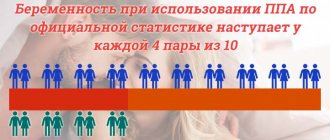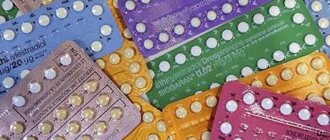Many girls firmly believe that menstruation is the most reliable method of contraception that nature itself has endowed women with. What do experts say, is it possible to get pregnant on the first day of your period? It turns out that this is quite possible, so even these days a woman who does not want to conceive should use contraception. It’s fair to say that the probability of conception in this situation is negligible, but it still occurs, so you shouldn’t forget about it.
The onset of the ovulatory period varies for each woman
Physiological features of conception
Before asking doctors whether it is possible to unexpectedly become pregnant during menstruation without protection, you should independently understand how exactly the female reproductive system functions and how a child is conceived. If we talk about conception during menstruation, then its likelihood is much higher in women with irregular cycles. Every month, changes occur in the organs of the reproductive system that are characteristic of each of the three phases:
Follicular
The phase was named so due to the process that occurs during the 14 days of the stage duration, namely the maturation of the follicles. Only one of them will carry an egg that is ripe for fusion with a sperm. The stage begins on the first day of menstruation, which normally lasts 3–7 days, now the old endometrium leaves the uterus. The bubbles mature due to the constant production of follicle-stimulating hormone. The duration varies from 7 to 21 days, depending on the length of the cycle.
Ovulatory
It lasts 24–48 hours, during which a mature gamete is released from the main follicle due to a sharp release of luteinizing hormone. She is already ready to merge with an active sperm, if he waits for her in the cavity of the fallopian tube, fusion will definitely occur.
Luteal
After the gamete has left the Graafian vesicle, the growth of the corpus luteum begins in the area of the ruptured follicle. In the case when the egg has not been fertilized for two days, it dissolves in the myometrial layer of the uterus, leaving the organ along with menstruation, the corpus luteum atrophies. If conception has taken place, with the help of this body the production of progesterone is launched, which is necessary for the introduction of the gamete into the wall of the reproductive organ and the continuation of gestation.
The likelihood of suddenly getting pregnant during menstruation depends on several factors - the cyclic duration and number of days of menstruation, the presence or absence of problems at the hormonal level, sperm viability and others.
The fertile window is the time frame during which the chances of conception are highest. With a standard 28–30 day cycle, the likelihood of pregnancy is high in the middle of the cycle, on days 14–15 and another four days before ovulation.
The duration of the cycle varies:
- short – less than 21 days;
- average (taken as the norm) – 28–30 days;
- long – 35 days.
A cyclic duration in the range of 21 to 35 days is normal, especially if it remains constant.
When a woman’s period comes either every 25 days or starts after 35 days, this is a reason to visit a doctor and identify hormonal disorders.
Menstrual cycle
Is it possible to get pregnant on the 3rd day of your period? With a regular menstrual cycle, the likelihood of such an outcome is extremely low. But such an event cannot be completely ruled out. If the cycle is irregular, the likelihood of pregnancy during this period increases. In this case, it is impossible to practice a contraceptive method in which “dangerous” and “safe” days are calculated. In this case, the exact duration of each phase of the cycle cannot be determined.
It is also worth considering that sperm can retain their ability to conceive in the uterine cavity for a long time. Therefore, it is impossible to predict at what point fertilization occurred. Typically the menstrual cycle consists of the following parts:
- From days 1 to 14, the dominant follicle in the ovary matures. It contains the egg.
- Ovulation occurs on days 14-16. This process usually lasts about 3 days. At this time, the egg leaves the follicle and goes to the uterine cavity. Sometimes this leads to pain in the ovarian area.
- Days 16-28 of the cycle are called the luteal phase of the cycle. At this time, in addition to estrogen, progesterone begins to be actively produced. This process controls the corpus luteum, which forms at the site of the mature follicle. This is necessary so that new eggs do not mature during this period. If fertilization occurs, the corpus luteum begins to intensively produce hormones necessary to maintain pregnancy. If this does not happen, it becomes smaller. The endometrium that has grown during this time begins to be rejected. Your period arrives and a new cycle begins.
Conditions necessary for pregnancy to occur
When assessing the likelihood of conception during menstruation, it is important to take into account not only the time of the cycle, whether it will be favorable for pregnancy, but also compliance with all the conditions necessary for fertilization:
- Sexual intercourse should take place on the last day of menstruation, as close as possible to the ovulatory phase.
- Sperm must be viable in order to retain their properties when passing through the cervical mucus, survive in an acidic environment for several days and penetrate the mucous membrane of the gamete.
- Cervical secretion should not be too viscous, so as not to deprive sperm of viability and the ability to reach the uterus.
- Both partners should not use protection.
- There should be no acute or chronic infectious diseases.
If several factors coincide successfully, pregnancy can occur during a period that is unfavorable for fertilization - during menstruation. This fact must be taken into account if a couple does not want to have children yet.
Late pregnancy: consult a doctor immediately!
If bleeding occurs late in pregnancy, the woman needs to make sure that it is not in any way related to a minor injury or fracture. If your periods are heavy, then medical intervention is required urgently. As a rule, internal bleeding indicates a serious threat of miscarriage. But everything can work out if the woman goes to the clinic on time, where she will be under constant supervision until the birth.
There is no need to neglect your health and the health of your baby. Blood in the later stages is a bad sign, women usually understand this. We recommend that you do not hesitate if you have similar symptoms: bleeding, abdominal pain, vomiting, nagging pain in the back. All this can inevitably lead to the death of the fetus and also poses a danger to the life of the pregnant woman.
It's worth summing up. Bleeding in the early stages, as well as in the later stages, may indicate a dangerous pathology or warn the pregnant woman that a danger to the fetus exists, but it can be prevented. Never turn to witches and healers. There is nothing better discovered than medical help; do not neglect your internal sensations.
They are the best clue that something is wrong with you. The main thing is to find a good gynecologist who can immediately determine why the bleeding occurred, but, if not immediately, then at least prescribe a number of additional checks that will preserve your health and the health of your baby. Remember - often menstruation in the early stages in women occurs for natural reasons and does not pose any danger. But even in such cases, regular check-ups with doctors are necessary.
Should you allow intimate contact during menstruation?
Often couples refuse to have sex during the menstrual period, but many do not consider these days to be off limits in terms of sexual relations. Doctors do not prohibit intercourse on the days of menstruation, if you take precautions - protect bed linen and clothing from contamination, use condoms. There are several factors to consider:
- To release a large volume of blood, the uterus needs to open - mucus leaves the cervix, protecting the organ from infection, and there is a risk of developing inflammation.
- Due to the increased chance of contracting an infection, you should not engage in relationships with unverified partners.
- It is worth refusing sex at elevated body temperature, which actually indicates the presence of an inflammatory process.
If all safety conditions are met and the partners decide to have sex, for many women, sex during menstruation can reduce pain, eliminate headaches and nervousness, and shorten the duration of bleeding.
What do these periods mean?
Often, bleeding during pregnancy does not pose a threat to the life of the mother and child. But a woman needs to focus primarily on her own well-being. The absence of pain, vigor and good appetite mean that everything is fine with both of you, and a slight hormonal shift is not a problem at all.
However, be very careful, heavy bleeding, too dark or watery discharge, especially if they are accompanied by acute pain, is a reason to immediately call an ambulance. Such symptoms may indicate a threat of miscarriage, serious inflammatory processes, or an ectopic pregnancy.
Risks of conception during menstrual bleeding
Women with a stable cycle should worry less about whether it will be possible to get pregnant during or immediately after menstruation, since they can independently calculate their fertile window and take enhanced contraceptive measures on days favorable for fertilization. But the risks of its implementation always exist, and they depend on the cyclic duration:
- 28–30 days – with a standard cycle, the ovulation period falls on days 14–15. There are almost two weeks left before menstruation, therefore, if conception does not take place, the gamete descends into the uterus, and after two days it dissolves in the mucous membrane of the organ. By the period of menstruation there is no risk of pregnancy.
- Extended - with a cycle of 33–35 days, it is almost impossible to get pregnant during menstruation. Sexual intercourse even on the last day of menstruation with strong sperm is unlikely to lead to pregnancy, since the duration of the follicular stage is more than two weeks.
- Short - if the intervals between a woman’s periods are less than 21 days, and the menstruation itself lasts 6–7 days, the possibility of conceiving during it increases. The luteal phase has a standard duration of 14 days; it turns out that there are only 7 days left for the follicular and ovulatory phases. If your period lasts 4 days, and sexual intercourse was performed on the last day, with good sperm viability, one of them can wait for the gamete in the uterus and fertilize it.
Even against the background of stable menstruation, women who are not yet ready for motherhood are advised to, together with their doctor, choose a suitable method of contraception, because the cycle will not always remain regular.
Against the background of stress or a sudden hormonal imbalance, the duration of the phases may change and unexpected conception may occur, even during menstruation.
What affects conception?
Knowing what happens on the 3rd day of menstruation, many representatives of the fair sex do not understand why conception is still possible. There are many reasons for this. First of all, you need to take into account that sperm retain their ability to fertilize in the female body for up to 7 days. In addition, serious disruptions sometimes occur in the female reproductive system. It becomes almost impossible to calculate the duration of each phase of the cycle. This happens under the influence of unfavorable factors. Various reasons increase the likelihood of fertilization during menstruation. The main ones are:
- The cycle becomes irregular. Because of this, ovulation may occur at a different time, for example, at the very beginning of the cycle.
- Activity of male germ cells. Most sperm die 2 hours after intercourse. But the most active of them can pass through the cervical canal. They enter the uterine cavity. Here they remain alive for several days. For this reason, with a long cycle, the likelihood of getting pregnant on the 3rd day of your period is less than with a short one.
- Oral contraceptives. If you use such drugs not according to instructions, or regularly, an unplanned pregnancy may occur. If you stop taking contraceptives before your period, conception may also occur.
- Recent abortion and childbirth. During the recovery period, there is a possibility of conception even on the third day of menstruation. Hormonal balance after such events is disrupted. Because of this, ovulation may not occur at all or may occur on any day of the menstrual cycle. Especially after childbirth, it is almost impossible to determine when conception may occur.
To avoid unplanned pregnancy, you need to use reliable contraception.
Causes of cycle disruptions and conception during menstruation
Stable time intervals between menstruation and a logical sequence of phases one after another leave almost no chance of conception, which is why the question of whether it is possible to get pregnant on the 5th or 6th day of menstruation is asked more often by ladies with cyclic duration disorders. Many factors provoke disruptions in the functioning of the reproductive organs, which increases the likelihood of conception during menstruation:
- advanced infectious diseases;
- disturbances in the functioning of the endocrine system - diseases of the kidneys, adrenal glands, thyroid gland, diabetes mellitus;
- uterine fibroids, polyps in the uterus and ovaries;
- endometriosis;
- excessive physical and mental fatigue, stress;
- inflammation in the organs of the genitourinary system;
- long colds;
- a sharp drop in the protective forces of the female body.
Women who are aware of their health problems and are registered with doctors should choose a more reliable method of birth control than the calendar method.
Taking contraceptive pills
Despite long-term use of OK, many ladies are interested in whether it is possible to get pregnant on the first day after the start of menstruation - this outcome is extremely small if a woman uses the pills strictly following the instructions. The risk of conception increases several times if one or more factors are present:
- Violating the rules for taking the drug - skipping one or two days of taking a contraceptive or abruptly refusing it can trigger spontaneous ovulation, when several gametes mature in the follicles at once. Against the background of superovulation, even if one of them was not fertilized, the second may end up in the uterine cavity already during menstrual bleeding - this, with shortened intervals between menstruation, will lead to pregnancy.
- OCs are taken simultaneously with antibiotics or other potent drugs that are not combined with contraceptives - the effect of the contraceptive may partially decrease and disappear.
- The woman chose a contraceptive on her own without being examined by a doctor.
Girls who are postponing motherhood for now should have their blood tested for hormone levels, select the most effective OCs together with a gynecologist, and take them in accordance with the instructions. Then the risk of fertilization during menstruation, as well as at any other time of the cycle, will decrease to almost zero.
Increased sperm viability
The usual duration of sperm viability is from 2 to 4 days. In a physically healthy man who does not suffer from somatic diseases and leads a healthy lifestyle, the lifespan of sperm can be extended to five to six days. As a result, when a woman has a shortened cycle and sexual intercourse took place on the last day of her period, the sperm can wait for the gamete in the uterus for almost a week. This development of events is quite a sufficient condition for conception.
Repeated ovulation
Will it be possible to get pregnant during menstruation on the 3rd or 4th day? Women who are prone to re-ovulation syndrome have this chance (this is the maturation of two eggs simultaneously during one cycle). The onset of repeated fertility is due to hereditary predisposition, long-term use of pills containing hormones, including the period of preparation for IVF.
The probability of repeated ovulation is 10–17%, but it exists. If one mature egg entered the uterus in the middle of the cycle and was not fertilized, then the second could leave the follicle on the eve of menstruation.
When a woman has her period, the gamete is in the fallopian tube. As soon as the critical days end, she enters the reproductive organ, and a strong sperm is ready to fertilize her within two days, if the intimate act was performed on the last day of menstruation.
Is it possible to get pregnant during menstruation?
We’ll answer right away – it’s possible! The modern rhythm of life, stress, poor nutrition - everything can lead to a shift in the menstrual cycle. The female body is a fragile mechanism. The egg may be released not on the 15th, but on the 21st or 25th day, because you were very nervous. Or there may be a “random” egg due to hormonal disorders, the release of which cannot be predicted.
Many girls believe that during menstruation it is certainly impossible to get pregnant and do not protect themselves at all. For some reason, everyone thinks only about their eggs, forgetting that 50% of the success of conception depends on the sperm.
A sperm can live in the vagina for a week waiting for its egg. If sexual intercourse occurred, for example, on the 4th day of menstruation, then there is a chance that next month you will find out about pregnancy.
Causes and likelihood of pregnancy during menstruation
There can be many reasons for conceiving during menstruation. You should not be careless about your future and the future of your children. Moreover, protection is never superfluous, especially with a casual partner. Even if not pregnant, there is a high chance of contracting an STD.
Reasons that occur due to hormonal imbalance include:
- Irregular intimate life.
- Hereditary predisposition.
- A sharp hormonal surge.
All this leads to the development of several eggs, the release of one of them cannot be predicted.
Gynecologists say that in 6% of cases a woman becomes pregnant during her period.
Other reasons for pregnancy include:
- Violation of taking oral contraceptives.
- Sperm vitality.
- Diseases of the cervix.
- Irregular cycle.
If you want to prevent any chance of getting pregnant, you have two options:
- don't have sex;
- use good contraceptives.
There is no other option. There are no safe days.
Probability of getting pregnant during menstruation as a percentage
Having intercourse once at the end of your menstrual period may not lead to pregnancy, but the risk of conception increases if the couple repeats it repeatedly. When using the calendar method of birth control, such an approach is even more doomed to failure. If one intimate act can result in fertilization by 10–15%, then monthly unprotected contacts, even during menstruation, will sooner or later provoke an unplanned pregnancy. The probability of getting pregnant during your period is expressed as a percentage as follows:
- In the first two days, it is almost impossible to get pregnant; the risk is 1–2%. This fact is explained by the abundant flow of blood from the uterus, washing away the old unfertilized gamete and the tearing off of the endometrioid layer.
- On the third day - the chance of unexpected conception is small. With a shortened cyclic duration and early ovulation, when intimate intercourse occurs on the third day of menstruation, and the fertility window opens on days 6-8, conception with sufficient sperm vitality is realistically 2-3%.
- On the fourth day, it is worth using a barrier method of contraception, especially for women with hormonal imbalances, early ovulation and after taking OCs for a long time (superovulation may develop). The risk of getting pregnant is 4-5%.
The more days pass from the start of your period, the higher the risks of unplanned pregnancy become. Girls with extended menstruation (more than 6 days) and early ovulation should be more careful. On the fifth, sixth and seventh days, the chance of conceiving is 6–8%.
Intimacy during menstruation
Is it possible to have sex during menstruation? Most often, during this period, the couple refuses intimacy. This, firstly, reduces the risk of unwanted pregnancy, and secondly, avoids the development of the inflammatory process.
Doctors have different opinions on the question of whether it is possible to have sex during menstruation. This is not strictly prohibited. But you must always use a condom and strictly follow the rules of hygiene. During this period, the female body is especially vulnerable to infections. Immunity decreases somewhat, and the cervical canal opens. This opens the way for pathogenic microorganisms to enter the uterus.
For this reason, gynecologists do not recommend engaging in intimate contact during menstruation. Even if the partner is permanent, this can lead to serious consequences.
It is practically impossible for sperm to enter the uterus during menstruation. During this period, the most unfavorable environment is created for them. Therefore, it is possible to become pregnant, rather, thanks to those male cells that remained in the uterus after the last sexual intercourse before the onset of menstruation. Although it is possible that even during menstruation, some sperm can still penetrate the uterine cavity. The possibility of this cannot be ruled out, although it is negligible.
How to determine ovulation with an irregular cycle
To assess the risks, whether it is possible to accidentally become pregnant during menstruation on days 2 to 7 with unstable intervals from one menstruation to another, a girl should be more attentive to the signals of her body and pay attention to signs of approaching ovulation:
- Breast enlargement, it becomes sensitive and painful.
- A surge of energy, good health and mood - during the period of ovulation the body strives to realize the instinct of procreation, which is why the woman becomes attractive and the frequency of intimate contacts increases.
- Weak nagging pain on the side of the abdomen where the dominant follicle ruptured and the mature egg was released.
- The appearance of scanty viscous discharge is the discharge of cervical mucus from the cervix. It clears the way for sperm to reach the reproductive organ and maintains the viability of sperm.
- Increase in basal temperature - if a woman regularly measures it in the rectum in the morning, she cannot help but notice that before ovulation the thermometer readings become slightly lower, and during the period of egg release they increase to 37-37.3 ° C.
Girls who have long wanted to get pregnant regularly go to online forums, communicate with accomplished expectant mothers, read their reviews and comments, where you can find stories about conception occurring during menstruation. There, any pregnant woman can share the symptoms that appeared during the ovulatory period, thanks to which she was able to conceive even on days that were “unsuitable” for this.
First signs
Knowing whether it is possible to get pregnant on the 3rd day of your period, you need to consider a number of subjective sensations. If conception does occur, certain symptoms often appear. Some women don't feel them.
Most often, there is a feeling of drowsiness, fatigue, and even in the absence of serious stress, fatigue appears. There is a feeling of heaviness in the pelvic area, and a nagging pain occurs in the lower back. Bloating, flatulence appears, and the legs may begin to swell. The breasts become sensitive, even painful. It increases in size and may become covered with a vascular network. Body temperature rises slightly, appetite decreases, and nausea appears, especially in the morning. The woman becomes sensitive to odors.
To avoid unwanted pregnancy, you need to choose the right, reliable method of contraception. Conception can occur on almost any day of the cycle.
Unprotected sexual intercourse occurred at the end of menstruation - algorithm of actions
What unprotected sexual intercourse during menstruation can lead to and how to avoid unexpected consequences - the answers depend on the woman’s desire or unpreparedness for motherhood. If there is a suspicion that fertilization has occurred, several methods will definitely help to find out:
- Using a sensitive pregnancy test - they react to the hCG content in urine at a level of 10-15 mIU/ml, and they should be used several days before the delay.
- Blood test for hCG - the substance begins to be produced immediately after the implantation of the fertilized egg into the uterine wall. In the blood, the levels of the substance increase an order of magnitude faster than in the urine, so you can visit the laboratory for diagnosis 8–10 days after the expected conception.
- Ultrasound - it will not be possible to examine a very small embryo at the initial stage, but the doctor can conclude whether fertilization has occurred based on the presence of the corpus luteum. If it has not atrophied by the end of the cycle, this may indicate pregnancy. A decrease in the size of the corpus luteum and signs of scarring indicate that menstruation will begin soon.
Is pregnancy possible at the beginning of the menstrual period - if a woman does not want to become a mother yet, she has a short menstrual cycle and premature ovulation, she should use emergency contraception, the drug Postinor or Escapelle, and then choose an effective means of contraception.
The calendar method is one of the most unreliable means of birth control, especially for the fair sex with an unstable cycle and hormonal imbalances. Since the probability of becoming pregnant during menstruation exists, albeit small, for women who are not ready to become mothers, it is important to protect themselves with suppositories, condoms, IUDs or oral contraceptives.
Can menstruation occur during pregnancy if a woman has just recently completed her period?
Another question that worries millions of women. But doctors reassure: often bleeding in the early stages can be caused by natural causes. Indeed, during pregnancy, the uterus becomes noticeably thicker; the endometrial layer, the one where the fetus is born, receives the most protection. Usually the endometrial layer peels off in the absence of pregnancy, which is why menstruation occurs.
If pregnancy has occurred, why is there still bleeding? Most often, the egg does not have time to attach to the uterine walls before menstruation; it is fertilized, but bleeding in the mucous layer is already planned by your body. Such menstruation in the early stages does not pose any danger.
Next, we will consider cases when menstruation during early pregnancy is considered dangerous, and what you should not be afraid of.
Often small bleeding, which does not last at all, even seems like a couple of drops smeared on the linen, indicates an ordinary internal wound or scratch. This happens when a woman hits herself, she was examined too roughly at a doctor’s appointment, sometimes some microcracks or abrasions from scratching release blood.
Don’t be afraid, but rather check yourself for any microdamage. It happens that blood is released after active sexual intercourse. Indeed, the genitals during pregnancy become much more sensitive than before.
Sex in early pregnancy is not prohibited ! But it is important to explain to your partner that you are now in a “special position”, and you need to be treated more carefully and tenderly.
What other reason is most common in women in case of bleeding in the early stages?
Of course, hormones have the greatest influence on the body; if your background was not leveled out during the period of conception, then it can easily “sway” to the side. In women, certain hormones predominate, perhaps these are androgens, then bleeding will be profuse in the early stages.
Doctors ask you to contact them to correct the situation. In the early stages, this does not pose a threat to the fetus. If there is not enough progesterone, then this also does not pose a threat to the unborn child.
Bleeding usually goes away on its own. But, if it lasts a couple of weeks, then contact your gynecologist. He will prescribe you safe medications so that your hormonal levels have time to level out and not cause you any inconvenience.
Perhaps pathology is a serious reason. These are various disorders during the formation of pregnancy, which can lead to serious consequences if the problem is not noticed and corrected in time.
So, the first pathology is exfoliation of the fetal egg , which usually occurs at a very early stage. This problem is very difficult to detect, and menstruation seems to be only a minor symptom. With detachment of the ovum, everything depends on the scale. If the detachment is small, then a strong and healthy body will solve this problem itself and will begin to actively secrete the necessary hormones to stabilize the situation.
Progesterone is usually released. Therefore, it is so important to lead a healthy lifestyle in the early stages of pregnancy, not to worry, and not to allow strong changes in hormonal levels. Menstruation during recovery is usually scanty, but if the body cannot cope, then it intensifies and becomes profuse with bright discharge.
Severe abdominal pain, such as during heavy periods, is also possible. Contact a specialist while your body allows you to continue the pregnancy. Otherwise, a miscarriage is possible in the early stages, and this phenomenon is extremely unpleasant for a psychologically unprepared woman.
Mechanical damage to the vagina or even the cervix are also possible causes for bleeding. Usually, they are visible when examined by a gynecologist. He takes a smear, on which blood is clearly visible. To rule out a serious problem, do an ultrasound.
Even if this is early, you need to rule out serious internal damage. The development of the embryo, which should proceed without serious problems, usually does not respond to minor wounds, but if the injury is serious, it can also lead to miscarriage.
Dangerous days for pregnancy after menstruation, how to calculate
The fertilization cycle in women is set up in such a way that there are periods when the probability of pregnancy is very high and for those who do not want to become parents yet, it is worth knowing some of the features.
There are many ways to protect yourself from unwanted pregnancy:
- condoms (Durex Pleasure, Contex Romantic Love, VIZIT Hi-Tech Comfort);
- tablets (“Jas-plus”, “Logest”);
- suppositories (“Erotex”, “Pharmatex”);
- contraceptive sponges (Allendale Pharmaceuticals);
- intrauterine devices (Multiload KU-375, Goldlily Exclusive, Mirena).
However, all of these methods involve medication to one degree or another. But there are those that do not require a trip to a specialist, one of them is a calendar one. In medical practice it is called the Ogino-Clauss method.
Of course, the reliability of this method is from 30 to 60% and it is based on calculating “dangerous” days in the range of the entire menstrual cycle. And, most importantly, it can only be used by those women whose “critical” cycle is regular and without any failures.
It is important to know! The sperm lives in the fallopian tubes for 3–4 days; it can fertilize the egg after ovulation within two days.
Based on this, it is believed that with a 28-day cycle, ovulation occurs on days 13–14, and with a 30-day cycle – on days 15–16. Therefore, with a 28-day cycle, the most likely days to get pregnant are considered to be from days 11 to 16. Accordingly, for a 30-day cycle – from days 13 to 18.
A more accurate scheme for preventing unwanted pregnancy is the method of measuring basal temperature , and to be more precise, the temperature in the rectum.
It is measured in the morning without getting out of bed. And they keep statistics of values, write them down, for example, in a special personal “diary” for greater convenience. This needs to be done for about three months, preferably longer for complete statistics. At the beginning of the cycle, the temperature in the rectum is normally 36.6–36.7 °C. When ovulation occurs, the temperature drops to 36.2–36.4 °C. Then, until the start of critical days, it constantly remains above 37.0 °C.
“Unfavorable” days can be calculated by adding and subtracting 3 days to the serial number of the day on which ovulation occurs. These will be the very days of “increased attentiveness” if pregnancy is not planned.










